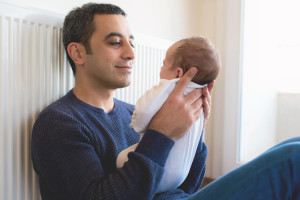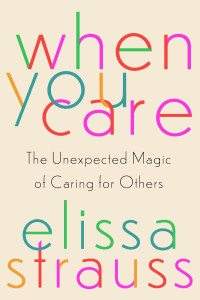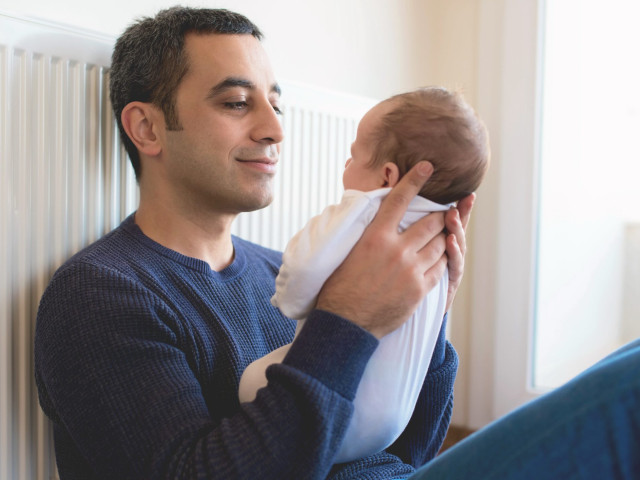By practically all measures, my first son was a straightforward child. Whereas most younger kids are strolling, raging ids, Augie was candy, composed, and strategic. He didn’t have tantrums, and put little effort into asserting energy only for energy’s sake. As a substitute, he was susceptible to cautious, deliberate calculations, a pragmatist in Velcro footwear. No battles over carrying the fire-truck T-shirt as a substitute of the police-car one; no tears if the cookie broke in two. He was nonetheless attending to eat a cookie, in spite of everything.

Elevating this sort of youngster made it straightforward to do the kind of issues that often trigger nice stress to oldsters of younger kids. We may eat meals at quiet eating places, journey lengthy distances, go to artwork museums, and depend on him to endure a day of tedious errands. At evening, I went to sleep much less bodily exhausted than a lot of my friends, and grateful for it.
However emotionally and intellectually, I used to be perplexed. This youngster of mine, at an unusually early age, had already begun changing intuition and instinct with motive.
Whereas most mother and father struggled to get their youngsters to take heed to others, my job was to get Augie to take heed to himself. I wished him to see the world on his personal phrases, much less beholden to exterior elements. To ensure that this to occur, I knew I must consciously and intentionally get out of his method.
This was not one thing that got here naturally to me. On the time once I had Augie, I used to be making my residing within the “scorching take” web increase of the 2010s; robust opinions had been my livelihood. Ask me a query or level to any information story, and by the tip of the day I may hand over 800 hard-edged phrases on the topic—satisfied I used to be proper. After I wrote, I didn’t lie a lot as ignore the opposite truths that will have blurred the singular reality I used to be specializing in. I had to attract a fast and neat line separating proper
from improper, and current the judgment as absolute and apparent.
Pre-motherhood, I nervous about how parenthood would destroy my capability to work, and ultimately it did simply that—however not in the way in which I anticipated. No, caregiving didn’t make me need to cease working, or worse at it. As a substitute, I started to query the kind of work I used to be doing as an opinion author, the sort of individual I had turn into by way of this work, and whether or not there might be a greater strategy to trade concepts.
That course of began with Augie and intensified once I had Levi, his much more passionate brother, 4 years later. The deeper I acquired into caring for 2 distinct people, the extra I started to query the understanding I paraded round in my writing and in my life. There are—an apparent and but nonetheless usually shocking reality—so some ways for an individual to be.
Up till that time, my formal moral schooling consisted of an intro to philosophy course that I had dropped out of after three weeks throughout my sophomore yr in school. As a substitute of conversations about large questions on easy methods to stay properly, the category was targeted on (a lot to my disappointment) out-there theoreticals that we must clear up with logic. Higher, I believed, to stay with poets. This labored till I had youngsters and realized I wanted extra in the way in which of philosophical steerage. How I believed I ought to be, how I believed an individual ought to be, was quickly being uncovered and punctured by care.
Philosophies of care
Few of us contemplate ourselves philosophers, however all of us suppose philosophically. We strive to determine what the “proper” factor to do is in sophisticated conditions, and ponder what actually issues in life. At an early age, we’re taught to separate proper from improper, and that sense of proper is meant to come back from inside: Do unto others as you’ll need performed unto you.

This essay is tailored from When You Care: The Surprising Magic of Caring for Others (Gallery Books, 2024, 320 pages).
As we become old, we’re usually taught to rely extra closely on motive and suppose extra broadly about proper and improper on a societal stage. Perhaps, if we’re formidable, we use this motive to attempt to reckon with common truths about freedom and justice, or wrestle with extremely summary and sophisticated philosophical hypotheticals, like philosophy 101 favourite the “trolley downside.”
However these big-picture beliefs and hypotheticals, with all their summary considering and impassive gamification, may solely inform me a lot about easy methods to stay my life. The one the place individuals aren’t tied up, like they’re within the trolley downside, however reasonably sophisticated, weak beings who want one thing from me. I wanted one thing else from philosophy, one thing that helped me perceive the ethical awakening I used to be experiencing in parenthood. I discovered this within the work of a lesser-known nook of philosophy known as care ethics.
There I found the work of girls like Nel Noddings, who explores how our intuition to care, an intuition that surfaces as early as infancy, is the inspiration of our obligation to be good. It is a great distance away from the numerous psychologists and philosophers who believed that intimate relationships—with all their biases, contradictions, and irrational moments—might be a hindrance to ethical considering. Noddings turns this 180 levels, arguing as a substitute that care is likely one of the biggest strategies of moral schooling.
By way of her work, I started to consider what precisely care is, and what it means to do it properly. Noddings distinguished between “caring for” somebody, which she defines as which means we each give consideration to the recipients of our care and reply to them, and “caring about,” which implies we give the recipients of our care consideration however don’t essentially reply. She additionally separated out what she calls “advantage carers” and “relational carers.” The previous are caregivers who do what they suppose is correct for the individual being cared for. The latter are caregivers who try to grasp what the individual being cared for wants after which go about making an attempt to supply that for them.
I went into parenting considering of my kids just like the readers of my opinion items: in want of a transparent and agency tackle the world round them. However what they wanted wasn’t a steadfast information, however somebody who stopped to pay shut consideration to their wants. On my greatest days, I’m a “relational carer.” I reply to questions with extra questions, I stay inquisitive about their wishes, all of the whereas hushing the a part of me that thinks, “This ought to be completely different, higher; they might be completely different, higher.” With time, I started to deal with others—associates, acquaintances, and even strangers—this fashion as properly.
As Noddings sees it, these moments of engrossed, responsive care can assist the caregiver type an “moral preferrred” of the sort of individual they need to be, a greatest self that may function a lodestar or reference level in different moments. “I’ve an image of these moments by which I used to be cared for and by which I cared, and I could attain towards this reminiscence and information my conduct by it if I want to take action,” she writes.
“Moments of engrossed, responsive care can assist the caregiver type an ‘moral preferrred’ of the sort of individual they need to be, a greatest self that may function a lodestar or reference level in different moments”
Philosophers have lengthy contemplated the methods transferring past our personal perspective generally is a ethical act. Simone Weil, a thinker who was born in France in 1909, known as consideration “the rarest and purest type of generosity.” Iris Murdoch, an Irish and British novelist and thinker, stated that “goodness” occurs after we “pierce the veil of egocentric consciousness and be a part of the world because it actually is,” she writes. Martin Buber, an American thinker and Jewish theologian, inspired his readers to try to see the opposite not as an object, however a messy, sophisticated entity that we expertise in all their shocking, complicated, and pleasant complexity. “All actual residing is assembly,” he stated.
And but, if it had been ever so easy. Typically caring for others makes us higher people general, and typically it doesn’t. For each caregiver or mother or father remodeled by care, there are many mother and father and caregivers who’ve been casually terrible, and even dedicated gross atrocities, to these they aren’t caring for whereas completely adoring the individuals they did take care of.
Making care common
Evolution performs a job right here. We’re wired to take care of these we determine with—whether or not that’s our household, tribe, or compatriots—greater than these we don’t determine with. This could make us biased, shortsighted, and even egocentric. It’s why we are able to without delay care about our youngsters whereas treating the lady we make use of to take care of them poorly. Or why we are able to care in regards to the individual caring for our youngsters whereas ignoring the fact of her kids residing in the identical neighborhood, or hundreds of miles away.

Higher Good Chronicles
A collection of essays by individuals making an attempt to use the science of a significant life to their every day lives.
Nonetheless, when a person says being a father modified him, made him extra empathic and affected person to all, or when a rich girl says caring for her toddler made her understand how vital common parental go away is—that now she cares about all moms—the metamorphosis strikes us as each believable and honest.
Care ethicist Sarah Clark Miller has wrestled with how care has the potential to open our hearts to some, whereas additionally treating others poorly. Her large philosophical query is: How will we bridge this hole? How will we make it so our intimate experiences of care, together with all these insights into human dependency, vulnerability, and subjectivity, lengthen to the broader world and translate to a extra caring society?
We may, she realized, consider care as an obligation, or a collectively agreed-upon rule and obligation. When care is an obligation, it tells us that we should care as a result of it’s elementary to the nice life. Care turns into one thing you do as a result of it’s the proper factor to do, a social norm that you simply don’t suppose a lot about. However, and that is the place Noddings’s push for receptivity is available in, we are able to go away the massive guidelines out of how we care. As a substitute, we should always depend on what we study by way of tending to that one-and-only individual to tell these choices.
“Again within the early days, there was nice optimism within the care ethics group that we simply must care extra after which we are going to turn into a extra caring society,” care ethicist Daniel Engster instructed me. “It’s not hopeless, nevertheless it requires much more cultivation than care theorists have thought.”
Cultivation can appear like higher authorities insurance policies supporting caregivers, which, in addition to giving them some monetary and sensible reduction, inform them that what they do issues. It additionally requires a tradition shift that takes us away from seeing people as a collective of people and as a substitute as a collective of relationships.
In some methods, Engster says this shift is already taking place, most notably in our dialog about earnings equality. For a very long time, equality meant that everybody needed to comply with the identical guidelines; now we usually tend to contemplate how one individual’s well-being compares in relation to a different, he defined. The extra we see one another as individuals in relation to 1 one other, the extra the teachings we study by way of care can plug into how we method the world at massive.
There may be, sadly, no single, surefire path to turning into a greater individual, but when the care ethicists train us something, it’s that relationships are as legitimate a path for searching for reality, equity, and goodness as motive. Since turning into a mother or father, I often consider whose philosophical epiphanies depend in our society, and the way this authority is set.
The picture of Auguste Rodin’s sculpture “The Thinker” usually involves thoughts. A powerful man, sitting down, chin resting on his knuckles; aquiline nostril and tense forehead drawing the viewer’s consideration to his eyes, which, in return, gaze downward, oblivious to his environment. Rodin stated he supposed the person to look like considering with “each muscle of his arms, again, and legs, along with his clenched fist and gripping toes.” I just like the statue sufficient however have come to resent the story its recognition tells us in regards to the gestures, postures, and social circumstances of deep thought. What about these of us who’ve found themselves in moments of epiphany whereas trying into another person’s eyes, holding their hand, or rubbing their again as they laughed or cried or died?

